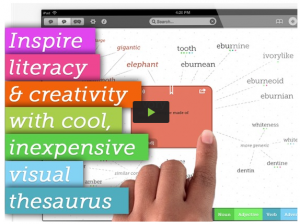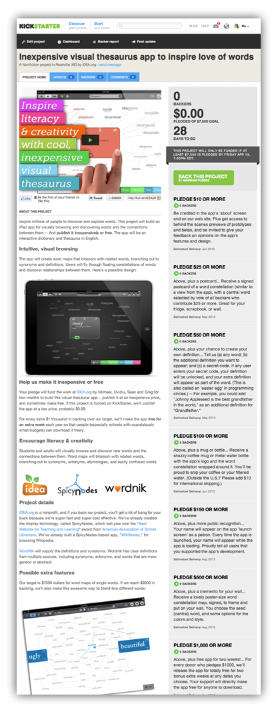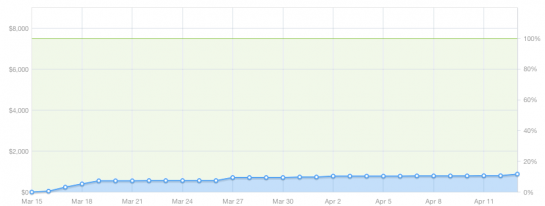Community Embraces New Word Game at Mid-Year Play Day This past Sunday, families at Takoma Park’s Seventh Annual Mid-Year Play Day had the opportunity to experience OtherWordly for the first time. Our educational language game drew curious children and parents to our table throughout the afternoon. Words in Space Several children gathered around our iPads […]
Read more IDEA is in the planning stages of a new project, to create a new thesaurus app for the iPad. As an experiment, we investigated whether “crowd funding” is a viable way to fund new educational apps. Our Kickstarter project was not funded, but we are still making the app!
IDEA is in the planning stages of a new project, to create a new thesaurus app for the iPad. As an experiment, we investigated whether “crowd funding” is a viable way to fund new educational apps. Our Kickstarter project was not funded, but we are still making the app!
Here’s some information about our Kickstarter experiment.
What is KickStarter?
KickStarter is a way to fund creative projects. They contributed $67 million to arts projects in 2011, and are on track to distribute more money to the arts in 2012 than the National Endowment for the Arts.
 Individuals and organizations post a project, set a target budget, create a pitch video, define rewards, and hope enough people will pledge to back their project. Only fully-backed projects are funded. This all-or-nothing approach helps backers pledge with the confidence that they will only pay if enough other people also support the project.
Individuals and organizations post a project, set a target budget, create a pitch video, define rewards, and hope enough people will pledge to back their project. Only fully-backed projects are funded. This all-or-nothing approach helps backers pledge with the confidence that they will only pay if enough other people also support the project.
 Our KickStarter experiment
Our KickStarter experiment
We posted a project to create a visual thesaurus app. (Preview at right.) The premise of our project was to raise funds to cover most of the development costs, and then release the app inexpensively or free. Free apps tend to be downloaded 10x-100x more than paid apps, even more so for educational content.
The time commitment was approximately 9 days. Of that, 5 days were spent on initial designs and mockups for our app idea; 2 days to write and revise a script, and produce the promo video; a day to plan and write up the KickStarter project page, and a day for updates and feedback to backers.
Video production was done using Final Cut Pro, and audio was recorded with a Sennheiser e935 microphone, pop filter, and Focusrite Saffire Pro 14 audio adapter, and edited using Adobe SoundBooth and Peak Pro. The royalty-free music was found at SoundCloud.
Why crowd-fund?
Educational apps are stagnating relative to the overall explosion of mobile devices. Current challenges stifling educational apps include:
- Weak economics – Aside from mobile textbooks (which are required purchases by school districts), kids, parents, and teachers are slow to pay for educational apps. The market of consumers who will pay $5 or $10 for an educational app is small. Funding has to come from other places.
- Hard to make – Good educational apps require an expensive microcosm of skills, from content development and outreach, to user interface design and programming. Existing educational industries (e.g., publishing, museums) do not have the expertise to select and manage teams who make apps.
- Fear of cannibalism – As budgets shrink, institutions are afraid of giving away too much for free. It’s a disgrace that massive back catalogues of educational content, videos, and object collections are not already online and in apps.
- Poor funding models – Since apps are costly to produce, app publishers typically need either grant funding, a large financial upside to justify self-funding or investor-backing… or … maybe crowd-funding?
Is it appropriate for apps?
Our experience is no. The following is a graph of our funding, which shows initial growth in the first few days (it’s very exciting to have strangers back your project!), followed by flatlining funding despite coverage in five education/technology blog articles, 51 FaceBook “likes,” and over 180 followers on Twitter for this new project.

Our observation is that Kickstarter backers tend to be drawn to creative projects like new music albums or engineering projects (e.g., a new iPod dock or gadget), not to philanthropic-like projects. The promise of our project was to reduce the end-user price of an educational app, a proposition which was not appealing. Conversely, the pool of educators reached by blog coverage of our project were willing to retweet, but not to send their own money to back it.
Our Kickstarter is archived, and you can still see it. This was a worthwhile experiment in that it was an opportunity to build publicity about a new project, think about the value proposition of the project, and flesh out some early designs, but I would not recommend it to other app developers.
Updated 14-April-2012 with results of Kickstarter.


22 Mar 2012, 7:57 am
[…] of keeping everyone informed. Kickstarter will e-mail backers with updates, too. Also, we will be updating our blog with our progress. AKPC_IDS += "5673,";Popularity: unranked [?] Tags: idea.org, spicynodes, […]
02 Jun 2012, 10:36 am
"Our observation is that Kickstarter backers tend to be drawn to creative projects like new music albums or engineering projects" That is very true and one of the reason among others that appsplit started. Our goal is to do the same but for apps.
04 Oct 2012, 9:37 am
There are now several iPad application that release these day that we really enjoy and sometimes can help for business and good for making money,